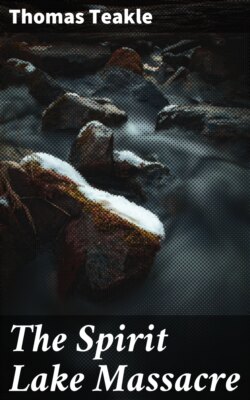Читать книгу The Spirit Lake Massacre - Thomas Teakle - Страница 10
На сайте Литреса книга снята с продажи.
VII
THE JOURNEY EAST FOR SUPPLIES
ОглавлениеTable of Contents
By February the unusual severity of the winter was occasioning some alarm at the lake settlements—particularly as the stock of provisions laid by for the winter was nearing exhaustion. In view of the deep snow and the intense cold it seemed more than foolish to think of attempting to make one’s way even to the nearest depot of supplies—which was Fort Dodge. The banks of snow were fifteen and often twenty feet high and offered an almost impassable obstruction to the use of teams. Add to this the intensity of the cold, and one can well imagine what courage or dire necessity it must have required to induce the traveller to set out for the purpose of making his way over an untrodden and in many respects an unknown waste of snow. But the food situation was such that it became increasingly evident that some effort must soon be made to relieve a condition which might become intolerable. Moreover, no one had had any experience in this section which would serve as an index to indicate how long the winter season might continue.
Finally, it was decided that Luce and Thatcher were to return to their former homes in the eastern section of the State in quest of the needed food. With a sled and an ox team they set out in the early days of February. The journey proved to be one of almost incredible hardships: the cold was nearly unendurable, while the banks of snow so impeded their progress that not infrequently little advance was made as the result of a whole day’s effort. In the end, however, they made their way safely to Hampton, but only to suffer the disappointment of learning that the settlers here could do little or nothing for them. Compelled to go still farther, they pushed on to Shell Rock, Cedar Falls, and Waterloo before they were able to obtain sufficient supplies for all the people at the lakes.
Securing at last the needed supplies, they remained at Cedar Falls for a brief time to permit the recuperation of both their oxen and themselves. Finally, they began preparations for the return journey which would probably prove more trying than the one east, for now they would be compelled to face the cutting winds and hard driven snows of the open prairies. Although warning of the possible hardships of such a journey was given by Luce and Thatcher, the prospects did not deter four young men from accompanying the two settlers upon their return to the lakes. These men were Robert Clark, a young friend of Luce from Waterloo; Jonathan Howe, the son of Joel Howe already settled at Okoboji; Enoch Ryan from Hampton, a son-in-law of Joel Howe; and Asa Burtch, a brother of Mrs. Joseph M. Thatcher.
In spite of the difficulties encountered, all went well on the return until the party reached a point known as Shippey’s near the mouth of Cylinder Creek in Palo Alto County, about ten miles south of the “Irish Colony”. Here the overloaded and exhausted oxen were unable to proceed any further. After some deliberation it was decided that Burtch and Thatcher should remain at Shippey’s and care for the oxen until they had regained their strength sufficiently to allow them to proceed upon the journey. Meanwhile, Luce, Clark, Howe, and Ryan were to hasten onward to the lakes with the good word that succor was near at hand. They made the trip on foot and in two days, reaching the settlements on the evening of March 6th. Here they found all well with the settlers who rejoiced at the prospect of relief in the near future.[111]
By a careful husbanding of resources and a system of mutual exchange the settlers had been able to prevent much suffering which a lack of care might have entailed. But the time had not elapsed without the occasional appearance of Indians. Apparently a number of red men were wintering in the groves near by, as it seemed unlikely that they could have come from any great distance. They were always friendly in their attitude toward the whites, who from time to time took occasion to relieve their too evident suffering from cold and hunger. They had not only been invited within the cabins to share the comfortable firesides, but were also encouraged to share in the settlers’ humble meals if they happened to arrive at meal time. They never left a settler’s cabin empty-handed at any time.
But as the time for the opening of spring neared it had been noted that the Indians grew more restless and less sociable: they seemed to avoid contact with the whites as much as possible. At the same time, the settlers, untrained in Indian ways, saw nothing singular in their later attitude and felt no occasion for alarm. Future developments, however, were to show that there had been more than one occasion for alarm. More than once the Indians had been observed to stalk each cabin and in other ways manifest an undue interest in the settlers. This, however, was accounted for at the time as untutored curiosity in things new and strange.
